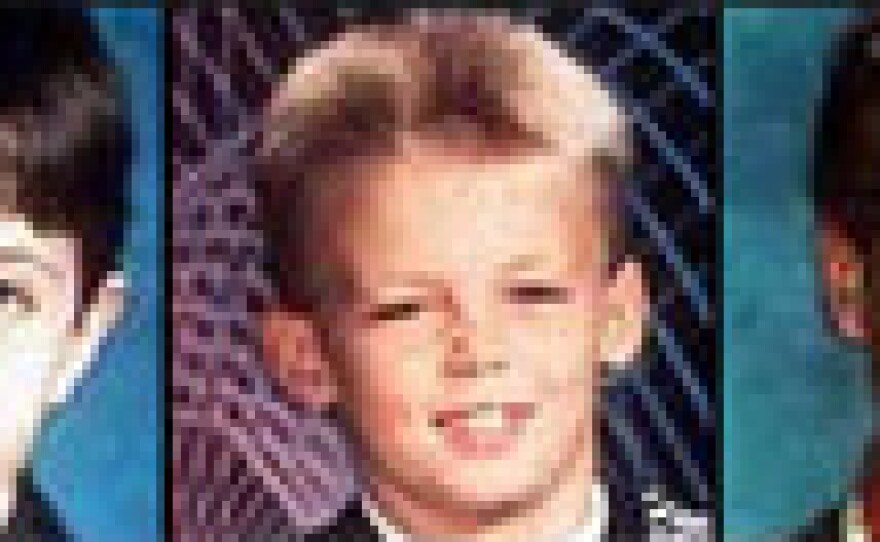

Nearly 15 years ago, three young boys were found dead in the woods behind a truck stop in West Memphis, Ark. The grisly crime shook the small town.
Three teenagers, one of them legally an adult, were soon arrested and ultimately convicted of the boys' murder. Two of them, Jessie Misskelley and James Baldwin, are serving life sentences. On Monday, lawyers for the third — death-row inmate Damien Echols, who was 19 when he and two friends became known as the "West Memphis Three" — will argue one of their client's last chances for appeal. The attorneys are starting the process of asking for a new trial based on DNA evidence.
Many people believe the wrong people went to jail, according to Marc Perrusquia, a reporter at the Memphis Commercial Appeal who covered the story and co-wrote one of the books about this case. "There was really nothing in the way of hard evidence" supporting the convictions, Perrusquia says.
Part of what keeps the case rolling, Perrusquia says, is claims by defense attorneys that new forensic evidence will clear the men. Another reason the case remains a sensation, he says, is that prosecutors originally singled out Echols because of his appearance.
"It was because of who he was," Perrusquia says, referring to Echols' tattoos, black hair and pretensions to Satanic worship. "He was different. If you were looking for someone to pin it on, he is the perfect guy."
Perrusquia say one moment in court testimony in particular doomed the 19-year-old. Even before the case, Perrusquia says, Echols had been placed under supervision by juvenile authorities; Echols is said to have claimed he liked to drink human blood. "He told the counselor ... that it made him feel like a god," Perrusquia says, remembering the testimony. "That is no doubt what cinched it for the jury in giving him the death penalty."
The case has been the subject of two documentaries, and a third is in the works. It has also inspired two books and numerous calls for re-examination from local communities and celebrities. This week Eddie Vedder auctioned off tickets to many of his shows, with proceeds going to the West Memphis Three's legal fund.
The story has a significant following online. Supporters of the West Memphis Three are angry, Perrusquia says, because it appeared that police and prosecutors won a conviction against Echols based on preconceptions and misunderstandings about so-called "Goth" culture.
"They had their target on Damien from the beginning," Perrusquia says. "There were reports ... that Damien was into the occult, that he planned to sacrifice babies. There was a lot of hype wrapped around it."
As Perrusquia recounts the case, the three boys were found murdered and dumped in a drainage ditch. The crime happened after a heavy rain, and investigators contended that water washed away the evidence that could build a definitive case. Perrusquia says law enforcement found no incriminating fingerprints or body fluids of any kind.
"Into this vacuum steps this young man, Jessie Misskelley," Perrusquia says. The reporter says the prosecutor's case ultimately rested on a confession from Misskelley, one of the other teenagers. Misskelley had tested low enough on an IQ test to be considered borderline retarded. "So much of what he says in there is inconsistent," Perrusquia says.
There are also suggestions that Misskelley's confession was coerced. "When Jesse was called into the police station, he was in there for about seven hours," Perrusquia says. "None of it was taped, until the very end, [when] about 45 minutes were taped."
As for inconsistencies, Perrusquia says that Misskelley testified the boys had been tied up with rope, when in fact they were tied up with their own shoelaces. Perrusquia also says that Misskelley testified the boys were murdered in the morning. "The boys were all in school in the morning," Perrusquia says.
However, Misskelley made two other confessions, including one just before the trials. "Jessie confessed a third time with prosecutors and defense lawyers in the room and a tape recorder running, and the story was substantially the same," the reporter says.
Echols himself was accused of having made a sort of confession. Female witnesses, Perrusquia says, testified that Echols bragged about the murders at a softball game. The defense argues that he was just trying to get attention. An alleged jailhouse confession by Baldwin is also tangled, Perrusquia says, "as so many elements in this case are."
Copyright 2022 NPR. To see more, visit https://www.npr.org. 9(MDAzMjM2NDYzMDEyMzc1Njk5NjAxNzY3OQ001))





